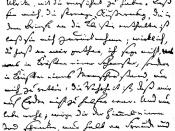Jean-Pierre Giradoux's Amphitryon Although they are based on the same general idea, Jean-Pierre Giraudoux's Amphitryon 38, and Heinrich von Kleist's Amphitryon are two very different plays. In both plays, the god Jupiter attempts to seduce the Greek beauty, Alkmena, while at the same time she fights to remain chaste. The differences between the plays lie in both the plot and the nature of the characters.
Amphitryon 38 chronicles two nights in Alkmena's life: one night is spent with her husband, Amphitryon, and the second, which is described in greater detail, is spent with Jupiter in Amphitryon's form. In this version, Jupiter is a much more sensitive character, as he actually cares about the fate of Alkmena and Amphitryon's relationship. In fact, Jupiter sends a message in the wind so that the entire earth can hear that he is going to visit Alkmena and offer her immortality, even Amphitryon knows.
Alkmena was supposed to be happy that she'd been chosen by a god, but when Jupiter arrives in her bedroom, she tells him that she would kill herself if any acts of sin were committed between the two. Jupiter understands her dilemma and naivete, knowing that she would actually follow through with such sinister actions, he does not have the vindictive nature seen in Kleist's version.
Giradoux's version had some good aspects, but it was also lacking key components that would have stimulated dimension and interest. I felt that compressing Sosia's character was one of the play's greater flaws. Sosia was virtually eliminated, consequently eliminating the comic relief that made Kleist's Amphitryon a pleasure to read. The few lines that Sosia did have were perhaps unnecessary. Furthermore, Giradoux's Amphitryon was missing the egotistical nature of Amphitryon that made Jupiter's actions forgivable, as though he'd put Amphitryon back in line. Whereas in Giradoux's play, Amphitryon could be any poor fool in love with his wife; he did not seem to deserve this cruel punishment.
Giradoux's Amphitryon 38 seemed to retrace its steps repeatedly, never making any conclusions about human nature, or taking any risks. Putting the two plays together for analysis showed that Kleist's Amphitryon was a fun, easy to read lighthearted play, while Giradoux's was much less engrossing.




